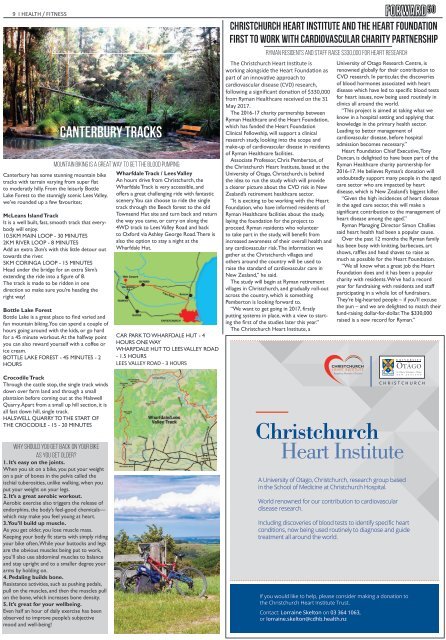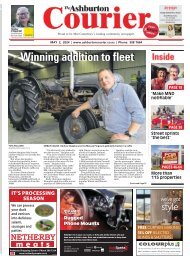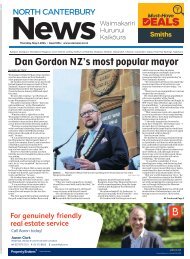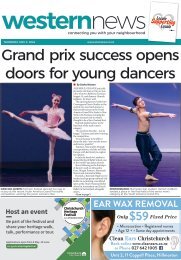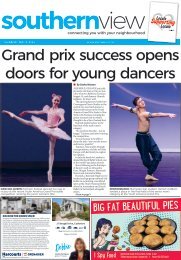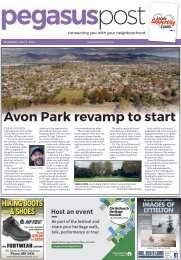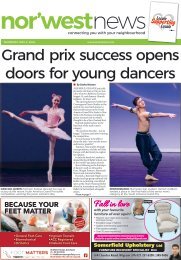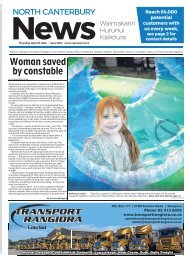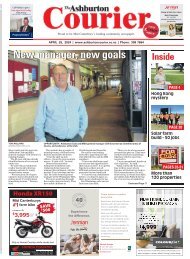The Star: June 22, 2017
You also want an ePaper? Increase the reach of your titles
YUMPU automatically turns print PDFs into web optimized ePapers that Google loves.
9 I HEALTH / FITNESS<br />
Canterbury has some stunning mountain bike<br />
tracks with terrain varying from super flat<br />
to moderatly hilly. From the leisurly Bottle<br />
Lake Forest to the stunnigly scenic Lees Valley,<br />
we’ve rounded up a few favourites;<br />
McLeans Island Track<br />
It is a well built, fast, smooth track that everybody<br />
will enjoy.<br />
10.5KM MAIN LOOP - 30 MINUTES<br />
2KM RIVER LOOP - 8 MINUTES<br />
Add an extra 2km’s with this little detour out<br />
towards the river.<br />
5KM CORINGA LOOP - 15 MINUTES<br />
Head under the bridge for an extra 5km’s<br />
extending the ride into a figure of 8.<br />
<strong>The</strong> track is made to be ridden in one<br />
direction so make sure you’re heading the<br />
right way!<br />
Bottle Lake Forest<br />
Bottle Lake is a great place to find varied and<br />
fun mountain biking. You can spend a couple of<br />
hours going around with the kids, or go hard<br />
for a 45 minute workout. At the halfway point<br />
you can also reward yourself with a coffee or<br />
ice cream.<br />
BOTTLE LAKE FOREST - 45 MINUTES - 2<br />
HOURS<br />
Crocodile Track<br />
Through the cattle stop, the single track winds<br />
down over farm land and through a small<br />
plantaion before coming out at the Halswell<br />
Quarry. Apart from a small up hill section, it is<br />
all fast down hill, single track.<br />
HALSWELL QUARRY TO THE START OF<br />
THE CROCODILE - 15 - 20 MINUTES<br />
Why should you get back on your bike<br />
as you get older?<br />
1. It’s easy on the joints.<br />
When you sit on a bike, you put your weight<br />
on a pair of bones in the pelvis called the<br />
ischial tuberosities, unlike walking, when you<br />
put your weight on your legs.<br />
2. It’s a great aerobic workout.<br />
Aerobic exercise also triggers the release of<br />
endorphins, the body’s feel-good chemicals—<br />
which may make you feel young at heart.<br />
3. You’ll build up muscle.<br />
As you get older, you lose muscle mass.<br />
Keeping your body fit starts with simply riding<br />
your bike often, While your buttocks and legs<br />
are the obvious muscles being put to work,<br />
you’ll also use abdominal muscles to balance<br />
and stay upright and to a smaller degree your<br />
arms by holding on.<br />
4. Pedaling builds bone.<br />
Resistance activities, such as pushing pedals,<br />
pull on the muscles, and then the muscles pull<br />
on the bone, which increases bone density.<br />
5. It’s great for your wellbeing.<br />
Even half an hour of daily exercise has been<br />
observed to improve people’s subjective<br />
mood and well-being!<br />
canterbury tracks<br />
mountain biking is a great way to get the blood pumping.<br />
Wharfdale Track / Lees Valley<br />
An hours drive from Christchurch, the<br />
Wharfdale Track is very accessible, and<br />
offers a great challenging ride with fantastic<br />
scenery. You can choose to ride the single<br />
track through the Beech forest to the old<br />
Townsend Hut site and turn back and return<br />
the way you came, or carry on along the<br />
4WD track to Lees Valley Road and back<br />
to Oxford via Ashley George Road. <strong>The</strong>re is<br />
also the option to stay a night at the<br />
Wharfdale Hut.<br />
CAR PARK TO WHARFDALE HUT - 4<br />
HOURS ONE WAY<br />
WHARFDALE HUT TO LEES VALLEY ROAD<br />
- 1.5 HOURS<br />
LEES VALLEY ROAD - 3 HOURS<br />
Christchurch Heart Institute and the Heart Foundation<br />
First to Work with Cardiovascular Charity Partnership<br />
Ryman residents and staff raise $330,000 for heart research<br />
<strong>The</strong> Christchurch Heart Institute is<br />
working alongside the Heart Foundation as<br />
part of an innovative approach to<br />
cardiovascular disease (CVD) research,<br />
following a significant donation of $330,000<br />
from Ryman Healthcare received on the 31<br />
May <strong>2017</strong>.<br />
<strong>The</strong> 2016-17 charity partnership between<br />
Ryman Healthcare and the Heart Foundation,<br />
which has funded the Heart Foundation<br />
Clinical Fellowship, will support a clinical<br />
research study, looking into the scope and<br />
make-up of cardiovascular disease in residents<br />
of Ryman Healthcare facilities.<br />
Associate Professor, Chris Pemberton, of<br />
the Christchurch Heart Institute, based at the<br />
University of Otago, Christchurch, is behind<br />
the idea to run the study which will provide<br />
a clearer picture about the CVD risk in New<br />
Zealand’s retirement healthcare sector.<br />
“It is exciting to be working with the Heart<br />
Foundation, who have informed residents of<br />
Ryman Healthcare facilities about the study,<br />
laying the foundation for the project to<br />
proceed. Ryman residents who volunteer<br />
to take part in the study, will benefit from<br />
increased awareness of their overall health and<br />
any cardiovascular risk. <strong>The</strong> information we<br />
gather at the Christchurch villages and<br />
others around the country will be used to<br />
raise the standard of cardiovascular care in<br />
New Zealand,” he said.<br />
<strong>The</strong> study will begin at Ryman retirement<br />
villages in Christchurch, and gradually roll-out<br />
across the country, which is something<br />
Pemberton is looking forward to.<br />
“We want to get going in <strong>2017</strong>, firstly<br />
putting systems in place, with a view to starting<br />
the first of the studies later this year.”<br />
<strong>The</strong> Christchurch Heart Institute, a<br />
University of Otago Research Centre, is<br />
renowned globally for their contribution to<br />
CVD research. In particular, the discoveries<br />
of blood hormones associated with heart<br />
disease which have led to specific blood tests<br />
for heart issues, now being used routinely in<br />
clinics all around the world.<br />
“This project is aimed at taking what we<br />
know in a hospital setting and applying that<br />
knowledge in the primary health sector.<br />
Leading to better management of<br />
cardiovascular disease, before hospital<br />
admission becomes necessary.”<br />
Heart Foundation Chief Executive, Tony<br />
Duncan, is delighted to have been part of the<br />
Ryman Healthcare charity partnership for<br />
2016-17. He believes Ryman’s donation will<br />
undoubtedly support many people in the aged<br />
care sector who are impacted by heart<br />
disease, which is New Zealand’s biggest killer.<br />
“Given the high incidences of heart disease<br />
in the aged care sector, this will make a<br />
significant contribution to the management of<br />
heart disease among the aged.”<br />
Ryman Managing Director Simon Challies<br />
said heart health had been a popular cause.<br />
Over the past 12 months the Ryman family<br />
has been busy with knitting, barbecues, art<br />
shows, raffles and head shaves to raise as<br />
much as possible for the Heart Foundation.<br />
“We all know what a great job the Heart<br />
Foundation does and it has been a popular<br />
charity with residents. We’ve had a record<br />
year for fundraising with residents and staff<br />
participating in a whole lot of fundraisers.<br />
<strong>The</strong>y’re big-hearted people – if you’ll excuse<br />
the pun – and we are delighted to match their<br />
fund-raising dollar-for-dollar. <strong>The</strong> $330,000<br />
raised is a new record for Ryman.’’<br />
Christchurch<br />
Heart Institute<br />
A University of Otago, Christchurch, research group based<br />
in the School of Medicine at Christchurch Hospital.<br />
World renowned for our contribution to cardiovascular<br />
disease research.<br />
Including discoveries of blood tests to identify specific heart<br />
conditions, now being used routinely to diagnose and guide<br />
treatment all around the world.<br />
If you would like to help, please consider making a donation to<br />
the Christchurch Heart Institute Trust.<br />
Contact: Lorraine Skelton on 03 364 1063,<br />
or lorraine.skelton@cdhb.health.nz


